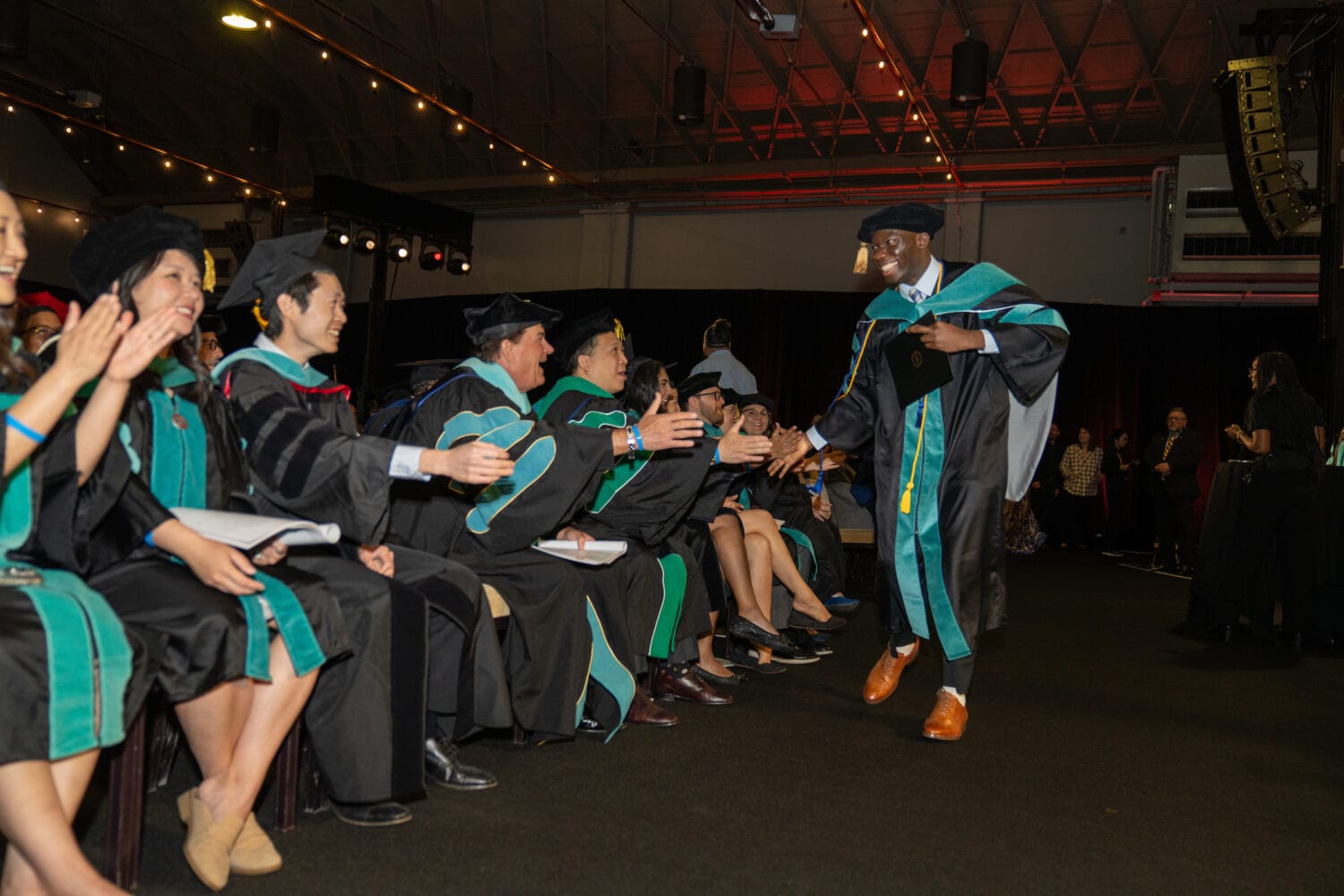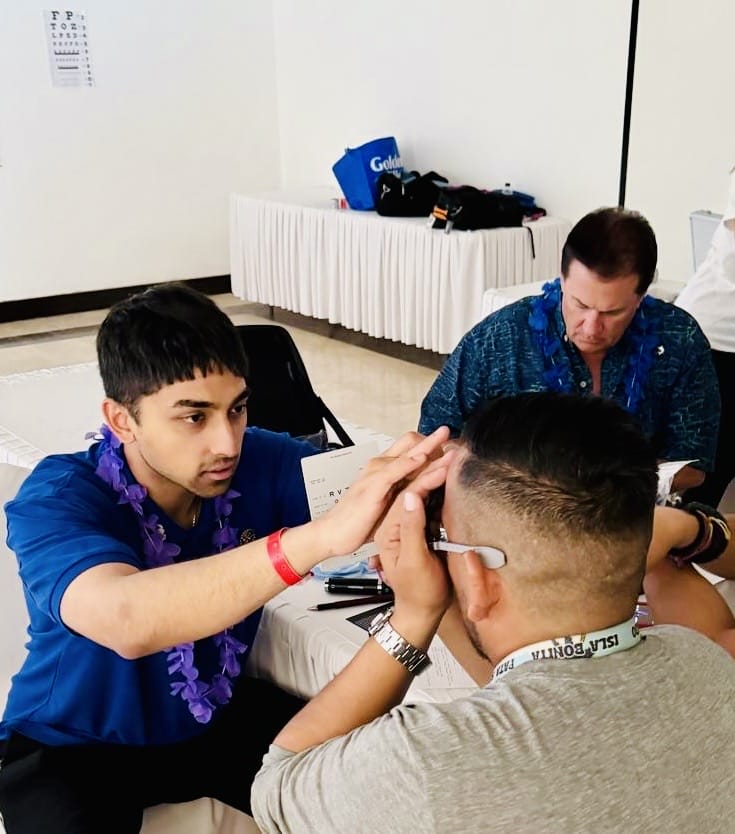WesternU Joins All-Pro Arizona Cardinals Wide Receiver Larry Fitzgerald in Spotlighting Vision, Learning & Dyslexia
In football, you expect to be tackled, but too many parents get tackled by all the choices they have to make when they have a child who struggles with reading and learning. As we enter the 15th year of observing August as National Children’s Vision and Learning Month, Larry Fitzgerald helps to set the record straight on the critical link between vision and learning.
“Parents don’t realize that you need more than 15 visual skills to succeed in reading, learning, sports, and in life. Seeing ‘20/20’ is just one of those visual skills,” Fitzgerald said.
When parents assume their child’s vision is fine, it can be difficult to figure out why their child is having so much difficulty with reading and learning, especially when professionals disagree and vested interests are involved. Many parents get overwhelmed by all the information and conflict, and just let the system take care of their children by making accommodations. Other parents refuse to be tackled and keep searching until they find help.
The new Patient Care Center at Western University of Health Sciences, in Pomona, Calif., has the professional expertise and understanding to diagnose and treat a variety of vision-related problems that children – and adults – face.
Vision is much more than seeing the blackboard in school. A child may see clearly and pass eye tests at school, but could still have problems, said Stuart Mann, OD, FCOVD, College of Optometry Chief of Pediatric Services and Assistant Professor. The testing at PCC’s Eye Care Center goes beyond distance.
Reading requires sustained clear vision at near. Some students have tracking issues. They must be able to sustain looking at an item and appreciate what it is.
In addition, children and adults are tested for speed of processing — how long it takes to look at something to know what it means. Optometrists will measure span — how much information you can grab at one point and remember. Stress levels play an important part in measuring these factors.
“A lot of people love to read, but give them something to read for school and they fall apart,” Mann said. “Reading to learn is a lot more stressful than reading for enjoyment.”
A student with a focus flexibility problem may have problems copying from the blackboard to their desk, hindering their note-taking ability. An issue with eye tracking can make it difficult to keep one’s place while reading, and an eye teaming problem will make it difficult to sustain visual attention.
“These are the types of things we look for,” Mann said. “All of our students are taught this is important for a child in school or an adult in school.”
The Eye Care Center at the Patient Care Center provides optometric vision therapy, not only for visually related learning problems, but also strabismus (eyes that turn in or out), amblyopia (lazy eye), vision problems resulting from acquired brain injury, or vision problems that can cause headaches or eye strain from sustained visual activities.
Even though a wealth of optometric research proves vision therapy works, there is false information in the medical community about such therapy. This can be confusing for parents, especially when it comes from their child’s pediatrician.
Dr. Joseph Manley, a physician and medical expert witness for medico-legal cases, states, “The conclusions (particularly the failure to recommend vision therapy for children likely to benefit from it) of the American Academy of Pediatrics report on Learning Disabilities, Dyslexia and Vision are based on exclusion of the most relevant data and inconsistent application of the Academy’s stated criteria for selecting evidence. They fail to
acknowledge abundant published and anecdotal evidence supporting the use of vision therapy. This overlooked evidence includes controlled trials, observational studies, case reports and consensus of experts — the same kinds of data that underpin the daily practice of medical professionals.”
Optometric vision therapy treats vision problems that make reading and learning difficult. While vision therapy does not treat dyslexia, vision problems can often be misdiagnosed as learning disabilities such as dyslexia or even ADHD. According to the American Optometric Association, studies indicate that 60 percent of children identified as “problem learners” actually suffer from undetected vision problems, and in some cases have been inaccurately diagnosed with attention deficit disorder (ADD) or attention deficit hyperactivity disorder (ADHD).
“I was fortunate that my vision problems were caught early in life,” Fitzgerald said. He credits the optometric vision therapy he received as a child as one of the keys to his success. He had a vision problem that was making it difficult to pay attention in school, and his grandfather, Dr. Robert Johnson, a developmental optometrist in Chicago, Ill., diagnosed the vision problem and prescribed the appropriate treatment.
Fitzgerald went through optometric vision therapy under the guidance of his aunt, Dr. Stephanie Johnson-Brown, who is currently executive director of the Plano Child Development Center, a not-for-profit vision care service corporation which was co-founded by her father, Dr. Johnson, in 1959. The center specializes in vision education and the identification and remediation of vision development problems in children and adults.
“Vision therapy made a big difference in my life and my career.” Fitzgerald said. “Don’t get tackled by misconceptions about the vital role vision plays in your child’s education. Take the time to learn more about how vision problems can interfere with success in school and in sports, and visit the College of Optometrists in Vision Development’s website.”
For more information about the PCC Eye Care Center at WesternU, or to make an appointment, call 909-706-3899 or visit http://www.westernupcc.com/eye.html.
About Western University of Health Sciences
Western University of Health Sciences (www.westernu.edu), located in Pomona, Calif., is an independent nonprofit health professions university, conferring degrees in biomedical sciences, dental medicine, health sciences, nursing, optometry, osteopathic medicine, pharmacy, physical therapy, physician assistant studies, podiatric medicine and veterinary medicine.
About COVD
The College of Optometrists in Vision Development (COVD) is an international, non-profit optometric membership organization that provides education, evaluation and board certification programs in behavioral and developmental vision care, vision therapy and visual rehabilitation. The organization is comprised of doctors of optometry, vision therapists and other vision specialists. For more information on learning-related vision problems, vision therapy and COVD, please visit www.covd.org or call 888-268-3770.



